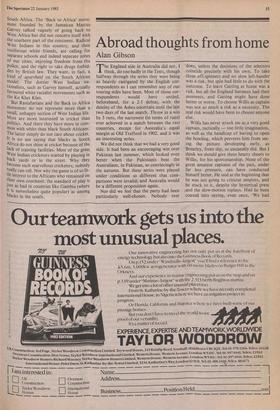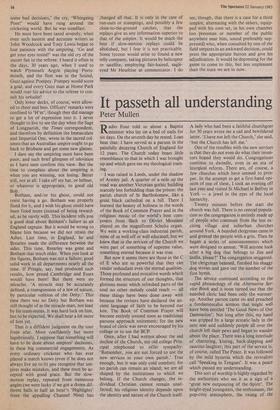Abroad thoughts from home
Alan Gibson
The England side in Australia did not, I think, do too badly in the Tests, though halfway through the series they were being as heavily castigated by the English cor- respondents as I can remember any of our touring sides have been. Most of those cor-
respondents would have settled, beforehand, for a 2-1 defeat, with the destiny of the Ashes uncertain until the last two days of the last match. Throw in a win by 3 runs, the narrowest (in terms of runs) ever achieved in a match between the two countries, except for Australia's equal margin at Old Trafford in 1902. and it was an interesting series.
We did not think that we had a very good side. It had been an encouraging win over Pakistan last summer, which looked even better when the Pakistanis beat the Australians, in Pakistan, so convincingly in the autumn. But these series were played under conditions so different that com- parisons were invalid; and Australia would be a different proposition again.
Nor did we feel that the party had been particularly well-chosen. Nobody ever
'does, unless the decisions of the selectors coincide precisely with his own. To take three off-spinners and no slow left-hander was a risk, but spin had little to do with the outcome. To leave Gatting at home was a risk, but all the England batsmen had their moments, and Gatting might have done better or worse. To choose Willis as captain was not so much a risk as a necessity. The real risk would have been to, choose anyone else.
Willis has never struck me as a very good captain, tactically — too little imagination, as well as the handicap of having to open the bowling, which prevents him from see- ing the picture developing early, as Brearley, from slip, so uncannily did. But I think we should give three hearty cheers to Willis, for his sportsmanship. None of the great amateur captains of the past, under far less pressure, can have conducted himself better. He said at the beginning that he was not going to criticise umpires, and he stuck to it, despite the hysterical press and the slow-motion replays. Had he been coaxed into saying, even once, 'We had some bad decisions,' the cry, 'Whingeing Porn!' would have rung around the cricketing world. But he was steadfast.
He must have been taxed severely, when even such austere and accurate writers as John Woodcock and Tony Lewis began to lose patience with the umpiring. `Go and get your eyes tested!' was the old cry of the soccer fan to the referee. I heard it often in the days, 30 years ago, when I used to watch Plymouth Argyle playing Ports- mouth, and the fleet was in the Sound, Guzz against Pompey. Pompey would score a goal, and every Guzz man at Home Park would roar his advice to the referee to con- sult his orkulist!
Only lower decks, of course, were allow- ed to cheer and boo. Officers' remarks were confined to `H'm', though they did manage to get a lot of expression into it. I never thought to live to see the day when the Sage of Longparish, the Times correspondent, and therefore by definition the Immaculate and Impartial One, wrote in the sacred col- umns that an Australian umpire ought to go back to Brisbane and get some new glasses.
I dare say the umpiring must have been poor, and such brief glimpses of television as I have seen confirm this view. But the time to complain about the umpiring is when you are winning, not losing. Better still, not at all. I take off my hat, or helmet, or whatever is appropriate, to good old Bob.
Botham, and/or his ghost, could not resist having a go. Botham was properly fined for it, and I wish his ghost could have been fined more (instead of being reward- ed, as he surely will). This incident tells you a good deal about Botham's failure as an England captain. But it would be wrong to blame him because we did not retain the Ashes. Last time, in England, he and Brearley made the difference between the sides. This time, Brearley was gone and Botham that much older. When you look at the figures, Botham was not a failure; good solid work in all departments nearly all the time. If Pringle, say, had produced such results, how proud Cambridge and Essex would have been! But there were no miracles. 'A miracle may be accurately defined, a transgression of a law of nature, by particular volition of the Deity.' This time there was no Deity but Botham was still thought of as the miracle-man, not least by his team-mates. It was hard luck on him, but to be expected. We shall hear a lot more of him yet.
That is a diffident judgment on the tour from afar. More confidently but more lugubriously, I suppose that something will have to he done about umpires' decisions, in these big commercial engagements. As every ordinary cricketer who has ever played a match knows (even if he does not always live up to it) you recognise that um- pires make mistakes, and these must be ac- cepted with good grace. But the slow- motion replay, repeated from numerous angles (we were lucky if we got a dozen dif- ferent balls in half an hour's `Highlights' from the appalling Channel Nine) has changed all that. It is only in the case of run-outs or stumpings, and possibly a few close-to-the-ground catches, that the replays give us any information superior to that of the umpire. It would be much the best if slow-motion replays could be abolished, but I fear it is not practicable. Some tycoon would arise to found a new telly company, taking pictures by helicopter or satellite, employing fair-haired, eagle- eyed Mr Heseltine as commentator. I do see, though, that there is a case for a third umpire, alternating with the others, equip- ped with his own set, in his own chamber (no pressman or member of the public anywhere near him, sound preferably sup- pressed) who, when consulted by one of the field umpires in an awkward decision, could press the appropriate button and give his adjudication. It would be depressing for the game to come to this, but less unpleasant than the state we are in now.







































 Previous page
Previous page